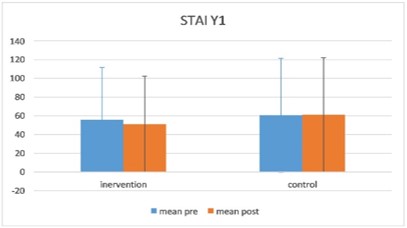Efficacy of Mind Sound Resonance Technique [MSRT] on Anxiety among Young Male Adults - A Randomized Controlled Trial
DOI:
https://doi.org/10.21760/jaims.9.1.5Keywords:
Anxiety, Mind sound resonance technique, Yoga, MeditationAbstract
Background and Objectives: Anxiety disorder is a most common psychiatric disorder. Mind Sound Resonance Technique [MSRT] was developed using the concepts found in ancient writings that discuss the influence of Nadanusandhana [HathaYoga Pradipika] and Om [Mandukya Upanishad] in gaining internal control over mental changes. Mind Sound Resonance Technique was found to be beneficial in the management of anxiety. Therefore, the purpose of this study was to evaluate how mind sound resonance therapy affects anxiety disorder. Materials and Methods: 60 male participants between the ages of 18 to 30 were enrolled, and they were split into study and control groups at random. STAI Y1 & STAI Y2, DASS were assessed before and after 8 weeks of intervention. All the details of the study were explained and informed consent was obtained from the subjects. Result: Result suggested that experimental group demonstrated state anxiety [STAI-Y1] [p≤0.05], trait anxiety [STAI-Y2] [p≤0.05], depression [p≤0.05], anxiety [p≤0.05], and stress [p≤0.05] scores all significantly decreased. Interestingly in the control group a notable rise in trait anxiety was seen [STAI-Y2] [p ≤ 0.05] and a similar but less extent of reduction in scores on the DASS for depression [p≤0.05], anxiety [p≤0.05], and stress [p≤0.05]. Conclusion/Discussion: The current investigation found that using the Mind sound resonance approach for 8 weeks on Anxiety subjects has shown to be significantly reduce in State Anxiety scores [STAI-Y1], Trait anxiety [STAI-Y2], DASS- Depression Anxiety Stress scores.
Downloads
References
Ramaiah S. All you wanted to know about anxiety. Delhi: Sterling Publishers Private Limited; 2002. 6 p.
Varambally S, George Sanju, Srinivasan TM, Hemant Bhargav, editors. The science and art of yoga in mental and neurological healthcare. New Delhi: Jaypee Brothers Medical; 2021.
Javaid SF, Hashim IJ, Hashim MJ, Stip E, Samad MA, Al Ahbabi A. Epidemiology of anxiety disorders: global burden and sociodemographic associations. Middle East Current Psychiatry. 2023 May 26;30(1):44.
Khambaty M, Parikh RM. Cultural aspects of anxiety disorders in India. Dialogues Clin Neurosci. 2017 Jun 30;19(2):117–126.
Adverse Childhood Events as Risk Factors for Negative Mental Health Outcomes. Psychiatr Ann. 2007 May;37(5).
Madasu S, Malhotra S, Kant S, Sagar R, Mishra A, Misra P, et al. Anxiety disorders among adolescents in a rural area of northern India using Screen for Child Anxiety-Related Emotional Disorders tool: A Community-based Study. Indian Journal of Community Medicine. 2019;44(4):317.
Satyanandasaraswati S. Asana Pranayama Mudra Bandha Yoga. 4th ed. Bihar: Yoga Publication Trust; 2013. 1 p.
Nagendra HR. Mind sound resonance technique. 2001.
Farach FJ, Pruitt LD, Jun JJ, Jerud AB, Zoellner LA, Roy-Byrne PP. Pharmacological treatment of anxiety disorders: Current treatments and future directions. J Anxiety Disord. 2012 Dec;26(8):833–843.
Lovibond PF, Lovibond SH. The structure of negative emotional states: Comparison of the Depression Anxiety Stress Scales [DASS] with the Beck Depression and Anxiety Inventories. Behav Res Ther. 1995 Mar;33(3):335–343.
Spielberger CD. State Trait Anxiety Inventory. Mind Garden 1690 Woodside Road Suite 202, Redwood City, CA 94061 USA; 1977.
Locke AB, Kirst N, Shultz CG. Diagnosis and management of generalized anxiety disorder and panic disorder in adults. Am Fam Physician. 2015 May 1;91(9):617–624.
Hofmann SG, Curtiss J, Khalsa SBS, Hoge E, Rosenfield D, Bui E, et al. Yoga for generalized anxiety disorder: design of a randomized controlled clinical trial. Contemp Clin Trials. 2015 Sep;44:70–76.
Doria S, de Vuono A, Sanlorenzo R, Irtelli F, Mencacci C. Anti-anxiety efficacy of Sudarshan Kriya Yoga in general anxiety disorder: A multicomponent, yoga-based, breath intervention program for patients suffering from generalized anxiety disorder with or without comorbidities. J Affect Disord. 2015 Sep;184:310–317.
Wang Y, Metri KG, Singh A, Raghuram N. Immediate effect of Mind Sound Resonance Technique [MSRT] – a yoga-based relaxation technique on blood pressure, heart rate, and state anxiety in individuals with hypertension: a pilot study. J Complement Integr Med. 2020 Jun 25;17(2).
Rao M, Metri KG, Raghuram N, Hongasandra NR. Effects of Mind Sound Resonance Technique [Yogic Relaxation] on Psychological States, Sleep Quality, and Cognitive Functions in Female Teachers: A Randomized, Controlled Trial. Adv Mind Body Med. 31(1):4–9.
Anusuya US, Mohanty S, Saoji AA. Effect of Mind Sound Resonance Technique [MSRT] – A yoga-based relaxation technique on psychological variables and cognition in school children: A randomized controlled trial. Complement Ther Med. 2021 Jan;56:102606.
Meenakshi PC, DGSV. Effect of Mind Sound Resonance Technique [MSRT]- Yoga Based Relaxation Technique on Sleep Quality and Mental Health in IT Professionals: A Pilot Study. Ann Yoga Phys Ther. 2021;5(1).
Bhargav H, Metri K, Dhansoia V. Immediate effect of Mind Sound Resonance Technique on state anxiety and cognitive functions in patients suffering from generalized anxiety disorder: A self-controlled pilot study. Int J Yoga. 2015;8(1):70.
Lee JK, Orsillo SM. Investigating cognitive flexibility as a potential mechanism of mindfulness in Generalized Anxiety Disorder. J Behav Ther Exp Psychiatry. 2014 Mar;45(1):208–216.
Dhanjani SVP, SA. Effect of MSRT [Mind Sound Resonance Technique] on Quality of Sleep in Geriatric Population. Int J Yoga Allied Sci. 2018;7(2):87–92.
Sharma DBH. Effect of Mind Sound Resonance Technique as an add-on to yoga therapy on quality of sleep, pain, stress and state anxiety levels in patients suffering from chronic musculoskeletal pain: Matched controlled trial. Int J Rev Life Sci. 2014;4(2):27–31.















